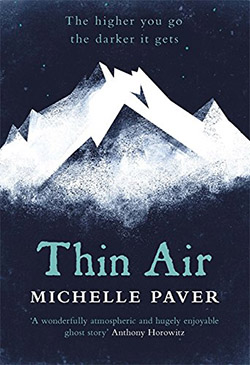It was on the back of the award-winning, six-part Chronicles of Ancient Darkness that Michelle Paver put out Dark Matter. A ghost story inspired by her lifelong love of the Arctic, it attracted flattering comparisons to the work of such giants of the genre as M. R. James and Susan Hill, and became, before long, a bona fide bestseller.
That the author has now turned her hand to another tale in the same vise-like vein can hardly be seen as surprising; what can is the fact that it’s taken her six years and another complete children’s series, namely the Gods and Warriors novels. But given the strength of Thin Air, a short, stirring and altogether masterful narrative set on the sheer slopes of the world’s third-highest hill, if it takes another decade for Paver to perfect its successor, that’s a decade I’ll be willing to wait.
It’s 1935, and mountaineering has the nation by the nape. Our protagonist Stephen Pearce has always been a keen climber, but he certainly wasn’t supposed to be conquering Kangchenjunga this spring. He was meant to be getting married and starting a family, but something about the life he could see stretched out ahead of him—and the death, yes—didn’t feel quite right, so when his big brother Kits basically begged him to follow in the footsteps of Edmund Lyell on an expedition up one of the Himalaya’s highest peaks, Stephen said yes.
Yet Kits’ request wasn’t exactly selfless. He needed a medic for the expedition to go ahead, and if securing one meant upending his younger sibling’s entire existence, then that was a price Kits was only too happy to pay to win the day. As Stephen reasons:
I know my brother. A couple of years ago, someone came upon Irvine’s ice axe on Everest’s north-west ridge, and Kits sulked for weeks. Why wasn’t he the one to find it and get all the glory? That’s what he’s after now: relics of the Lyell Expedition; and a chance to complete what the great man began, by being the first in the world to conquer an eight thousand-metre peak—with the added lustre of planting the Union Jack on the summit, and beating the bloody Germans.
Brothers they may be, but Stephen and Kits haven’t always—or even often—gotten on, and for all that they’re on their best behaviour at the outset of the trek, as the weather closes in and things threaten to get grim, the tension between them fairly flares.
Now we’ll get to the ghost of this ghost story in due course, but it’s this developing dynamic that truly underpins Paver’s tale. It starts simply enough, with the brothers being brothers, but the gentle jibes that fly at first become unbearably barbed before long, a bit of healthy competition turns into the worst sort of one-upmanship—and all this as they pick their way up a monstrous mountain that’s already killed countless competent climbers:
The sight of it is like music, a deep, strong note thrilling through me. It’s utterly different from Everest, or Annapurna, or K2. No lone triangular summit, but a vast broad-shouldered massif spiked with several chaotic peaks, with one jagged fang just dominating the rest.
They really can’t afford to be distracted. Alas, that they are, and by more than one another, for as they leave the “fairytale forests” of the lower slopes—note the unreality even here—they emerge into an “eerie upper world haunted by unseen creatures: snow leopard, wild blue sheep—and the coolies’ imaginary spirits. To them, this wilderness is thronged. Every rock and stream possesses demons,” demons that our Englishmen dismiss. Initially.
But truth to tell, there does seems to be someone, or something else on Kangchenjunga. Something that’s signified by an uncanny silence. Something that Stephen, empiricist that he is, struggles to explain away—though he absolutely tries:
It’s no good, I have to face the truth. There’s something terribly wrong with Camp Two,
What do I mean by wrong? Well I don’t mean ghosts. Not in the sense of disembodied spirits, I don’t believe in them. […] But energy, now. Energy can be neither created nor destroyed, so isn’t it at least possible that some kind of energy—perhaps magnetic, or even some force of emotion—may have lingered here for years? And perhaps—perhaps there’s something about me that makes me a sort of physical medium for that energy: like a battery, or a lightning rod?
It’s a hypothesis, and it makes me feel slightly better. I’ve put a frame around the wrongness. I’ve contained it.
Of course, containers break, and when the ghost of this ghost story does come to the fore, it’s all the more nerve-wracking because of its protracted absence. Now I don’t want to name its nature, but it’s a fitting sort of spirit to find near an evil peak, and one ably anticipated by the back story Paver shares in the early sections of the text, such that when the hammer finally falls, you feel it has every reason to.
In short, prepare to be scared. But it’d be a grave mistake to go into Thin Air expecting a standard supernatural narrative. What horror there is here is tied primarily to the characters: to Stephen and Kits and their struggle to survive in a landscape where almost nothing does; and to the climbers that tried and tragically failed to conquer Kangchenjunga both before and after the brothers at this book’s breast.
Impeccably researched, carefully controlled and terrifically told, Thin Air is a brief but brilliant exploration of the extent of human endeavour. It’s about the incredible things people, when pushed, can do… and the terrible things, too.
Thin Air is available in the UK from Orion Books.
Niall Alexander is an extra-curricular English teacher who reads and writes about all things weird and wonderful for The Speculative Scotsman, Strange Horizons, and Tor.com. He lives with about a bazillion books, his better half and a certain sleekit wee beastie in the central belt of bonnie Scotland.










